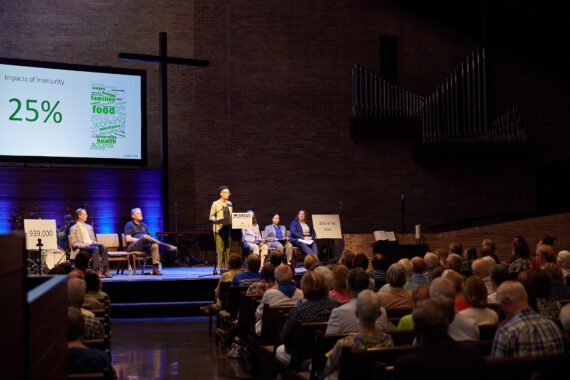Washington, D.C. –Poverty decreased slightly—by 0.5 percent—last year, according to new data released today from the U.S. Census Bureau. It is the first time a decrease has been seen since 2006. The bureau announced that 14.5 percent of Americans lived in poverty in 2013. Additionally, child poverty declined for the first time since 2000, from 21.8 percent to 19.9 percent. The figures are part of the Bureau’s annual report, Income and Poverty in the United States: 2013.
“The poverty rate has finally started to decline,” said Rev. David Beckmann, president of Bread for the World. “As we continue to climb out of the deep hole the recession put us in, the government has to focus on greatly reducing unemployment and income inequality.”
The reduction in poverty reflects the decrease in unemployment. In 2013, the annual unemployment rate was 7.4 percent. The most recent data from August 2014 show unemployment at 6.1 percent. This drop is partly due to 2.8 million more people moving to full-time, year-round employment.
According to the Economic Policy Institute, between 2009 and 2013, the top 5 percent of workers saw hourly wages rise by 1 percent, while the bottom 60 percent saw hourly wages fall by 4 to 6 percent. Higher incomes among high-income people and corporations have mainly shown up in higher stock prices, and companies have been slow to invest in the real economy.
“I’m encouraged that some leaders in both parties are at least talking about fostering greater economic opportunity for all Americans,” said Beckmann. “At the very least, Congress should spare us another round of budget brinksmanship. That would be good for the job market and continued progress against poverty, which continues to unjustly affect people of color.”
According to the Census Bureau, poverty rates in the Hispanic community decreased from 25.6 percent to 23.5 percent. The African-American community saw a slower decrease from 27.2 percent to 27.1 percent.
“The best defense against hunger and poverty is reliable work,” Beckmann continued. “As the mid-term election draws near, we must vote for leaders who are committed to increasing job opportunities and pray that their actions are guided by compassion and justice so that we can continue to reduce hunger and poverty.”



